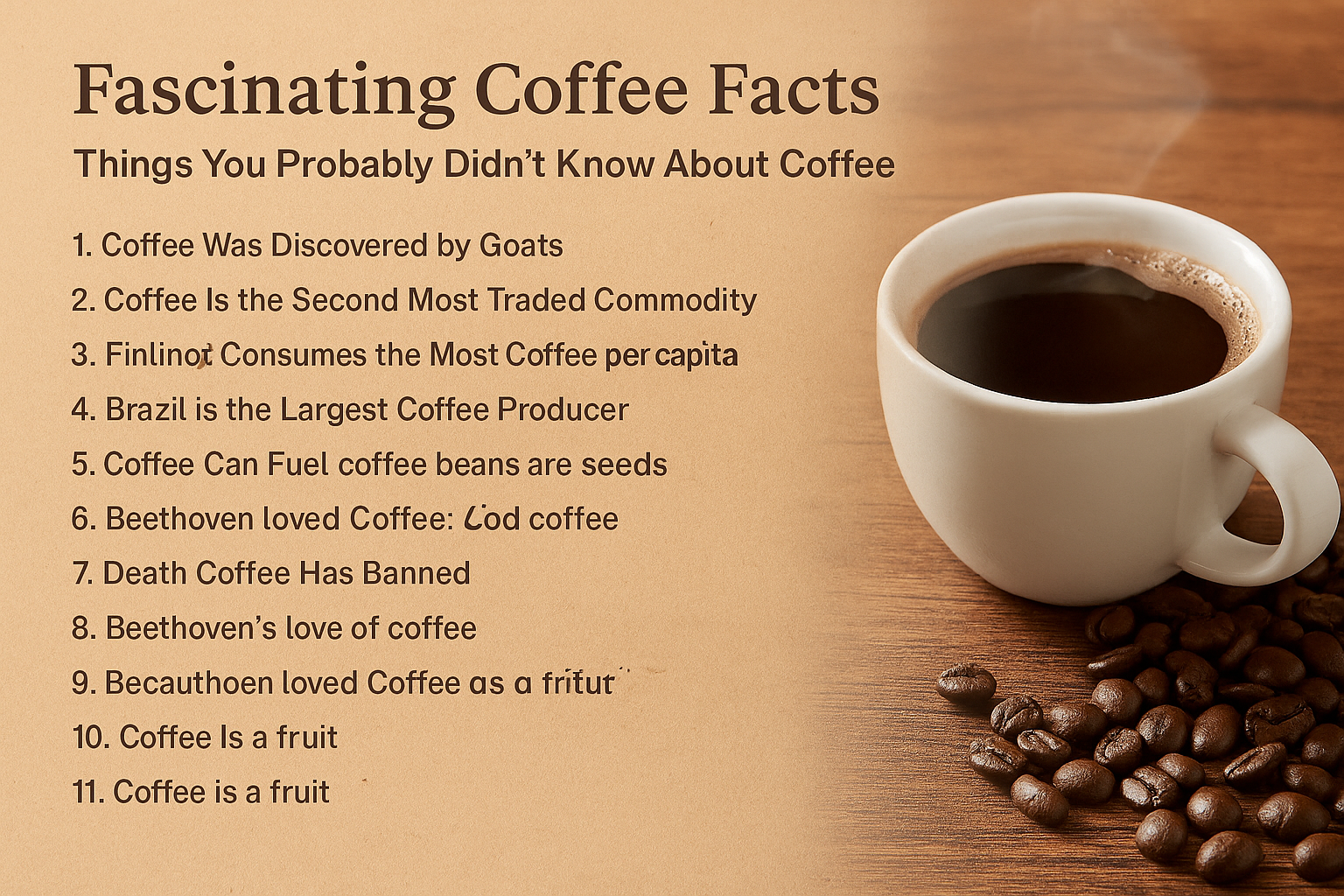Coffee is one of the most popular beverages in the world, enjoyed by millions daily. But beyond its energizing properties, coffee has a fascinating history and some surprising facts. Here are some intriguing coffee facts that every enthusiast should know.
1. Coffee Was Discovered by Goats
According to legend, an Ethiopian goat herder named Kaldi noticed his goats became unusually energetic after eating red berries from a certain shrub. This led to the discovery of coffee’s stimulating effects in the 9th century.
2. Coffee Is the Second Most Traded Commodity
After crude oil, coffee is the world’s most traded commodity. With over 2.25 billion cups consumed daily worldwide, it drives significant parts of the global economy.
3. There Are Over 120 Coffee Species
While most coffee comes from two species—Coffea Arabica and Coffea Canephora (Robusta)—there are more than 120 known species of coffee plants. Some are used in breeding for disease resistance.
4. Finland Consumes the Most Coffee Per Capita
The Finnish lead the world in coffee consumption, averaging about 4 cups per day per person. Coffee culture is deeply ingrained in Finland’s daily life.
5. The World’s Most Expensive Coffee Comes from Animal Excrement
Kopi Luwak, or civet coffee, is made using beans that have been eaten and excreted by the Asian palm civet. The digestion process is believed to improve the beans’ flavor, making this one of the most expensive coffees in the world, with prices reaching $600 per pound.
6. Coffee Can Fuel Your Workout
Caffeine is a natural performance enhancer, often consumed before workouts to improve endurance and reduce perceived exertion. It’s a common ingredient in many pre-workout supplements.
7. Decaf Coffee Is Not Completely Caffeine-Free
Contrary to popular belief, decaffeinated coffee still contains trace amounts of caffeine—usually about 2 to 5 mg per cup, compared to 95 mg in a regular cup.
8. Brazil Is the Largest Coffee Producer
Brazil has been the world’s top coffee producer for over 150 years, responsible for about one-third of global coffee production.
9. Coffee “Beans” Are Actually Seeds
What we call coffee beans are the seeds of the coffee cherry. These cherries are harvested, processed, and roasted to produce the coffee we drink.
10. Espresso Means “Pressed Out” in Italian
The term espresso refers to the method of forcing hot water through finely-ground coffee under pressure, rather than the type of coffee bean.
11. Instant Coffee Has Been Around Since the 18th Century
While often associated with modern convenience, instant coffee was first developed in the 1770s in Britain. Mass production began in the early 20th century.
12. Coffee Was Once Banned
In the 16th and 17th centuries, coffee faced bans in Mecca, Italy, and the Ottoman Empire due to concerns about its stimulating effects and the gatherings it encouraged.
13. The World’s Largest Coffee Cup Holds Over 22,000 Liters
The Guinness World Record for the largest cup of coffee was set in Colombia in 2019, containing more than 22,000 liters (almost 6,000 gallons) of coffee.
14. Beethoven Loved Coffee
The famous composer Ludwig van Beethoven was a coffee enthusiast, reportedly counting exactly 60 beans for each cup he made.
15. Coffee Is a Fruit
Because it comes from the coffee cherry, coffee is technically classified as a fruit product.
Final Thoughts
Coffee’s rich history, global influence, and unique characteristics make it much more than just a beverage. The next time you enjoy your cup of coffee, remember that it carries centuries of culture, science, and even a little bit of legend.
